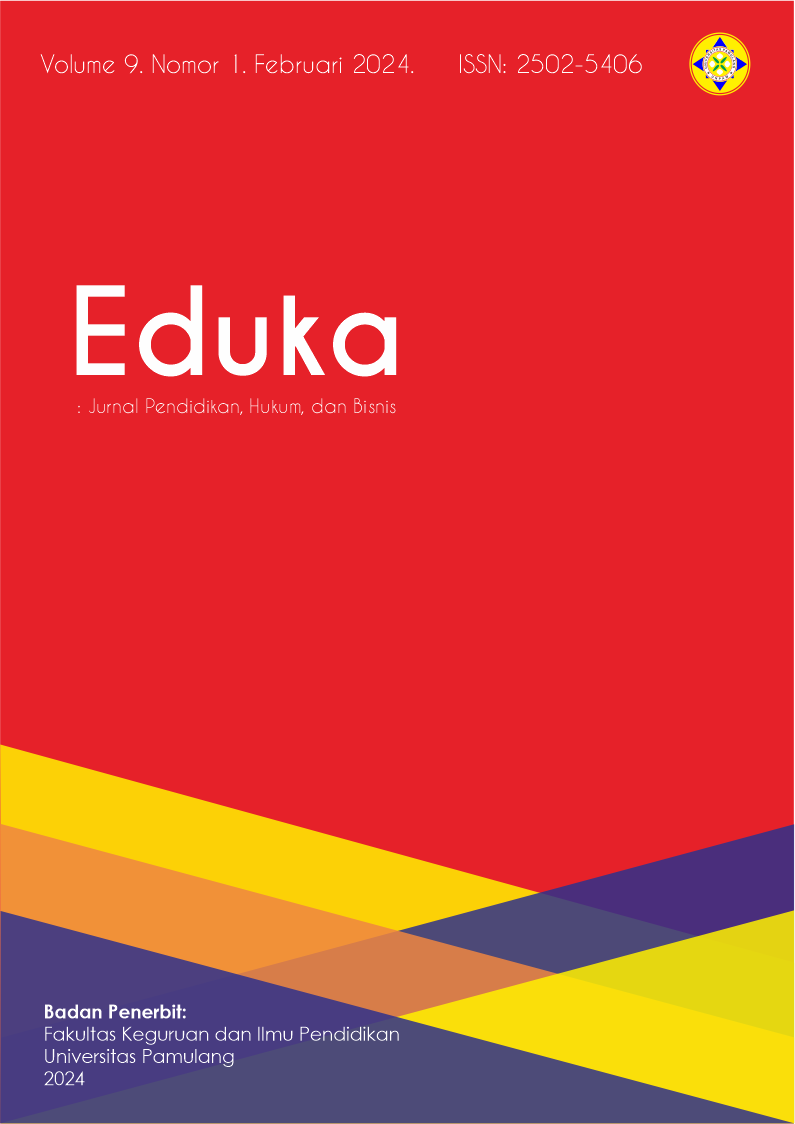Pengaruh Model Pembelajaran Reciprocal Teaching Terhadap Hasil Belajar Peserta Didik Mata Pelajaran PPKn Di SMK Negeri 1 Kota Tangerang Selatan
Abstract
Using a quantitative experimental design approach, this study aims to evaluate the impact of using reciprocal teaching on learners' learning outcomes. The reciprocal teaching model, which emphasises collaboration between teachers and learners, involves four main strategies: summarising, questioning, clarifying and predicting. After the treatment, the average score of students' learning outcomes in the experimental class increased to 82.43, while in the control class it increased to 64.17, with a difference (Mean Difference = 18.266). Before treatment, the average value of students' learning outcomes in the experimental class was 61.62, while in the control class it was 59.31. The Independent Sample T-Test test results indicated a significant difference (Sig = 0.000 <0.05) between the experimental and control groups. This confirms that students who followed the reciprocal teaching learning model experienced a higher increase in learning outcomes than the control group who used the direct instruction learning model. This finding indicates that the use of the reciprocal teaching learning model has an effect on the learning outcomes of students in PPPKn subjects at SMK Negeri 1 South Tangerang City.
References
Adi Apriadi Adiansha, Husnul Khatimah, & Asriyadin. (2020). Pengembangan Kreativitas Dalam Pembelajaran Matematika Melalui Model Brain Based Learning Siswa Sekolah Dasar. Jurnal Pendidikan Mipa, 10(1), 45–52. https://doi.org/10.37630/jpm.v10i1.327
Ammy, P. M. (2022). Pengaruh Penggunaan Model Reciprocal Teaching Terhadap Hasil Belajar Matematika Siswa Kelas VIII SMP. Jurnal Cendekia : Jurnal Pendidikan Matematika, 6(3), 2442–2453. https://doi.org/10.31004/cendekia.v6i3.530
Asyafah, A. (2019). MENIMBANG MODEL PEMBELAJARAN (Kajian Teoretis-Kritis atas Model Pembelajaran dalam Pendidikan Islam). TARBAWY : Indonesian Journal of Islamic Education, 6(1), 19–32. https://doi.org/10.17509/t.v6i1.20569
ÄŒernilec, B., CotiÄ, M., Felda, D., & Doz, D. (2023). Differences in students’ mathematics knowledge in homogeneous and heterogeneous groups. European Journal of Science and Mathematics Education, 11(1), 15–32. https://doi.org/10.30935/scimath/12431
Fauzy, A., Gde, S. U. A. A., Zinyfar, C., Nuraini, R., Purnia, Silvi, D., Irma, S., Evi, T., Permana, S. D. H., & Surmatiningsih, M. S. (2022). METODOLOGI PENELITIAN. CV. Pena Media.
Lestari, S. A., Wahid, L., & Sukmawati. (2022). Penggunaan Model Reciprocal Teaching Untuk Meningkatkan Kemampuan Menulis Teks Laporan Hasil Observasi Pada Siswa Kelas X IPA 2 di SMA Negeri 1 Wonggeduku. 4, 431–437. https://doi.org/10.31004/jpdk.v4i5.6625
Murniayudi, H., Mustadi, A., & Jerusalem, M. A. (2018). Reciprocal teaching: Sebuah inovasi pembelajaran abad 21 untuk meningkatkan pemahaman konsep mahasiswa PGSD. Premiere Educandum : Jurnal Pendidikan Dasar Dan Pembelajaran, 8(2), 173. https://doi.org/10.25273/pe.v8i2.3308
Nurgiansah, T. H., Hendri, H., & Khoerudin, C. M. (2021). Role Playing dalam Pembelajaran Pendidikan Pancasila Dan Kewarganegaraan. Jurnal Kewarganegaraan, 18(1), 56. https://doi.org/10.24114/jk.v18i1.22597
Octavia, S. A. (2020). MODEL - MODEL PEMBELAJARAN. CV Budi Utama : Deepublish.
Rahmina, & Rahmat, T. (2023). Pengaruh Model Pembelajaran Reciprocal Teaching Terhadap Hasil Belajar Dan Kemandirian Belajar Matematika. Jurnal Pendidikan Dan Konseling, 4, 1349–1358. https://journal.universitaspahlawan.ac.id/index.php/jpdk/article/view/12610/9735
Sihite, M. S. R. (2022). MODEL PEMBELAJARAN Reciprocal learning berbantuan hypnoteaching. CV.Literasi Nusantara Abadi.
Simbolon, M. E. (2019). Tuturan dalam Pembelajaran Berbicara dengan Metode Reciprocal Teaching. Media Sahabat Cendikia.
Sudaryono. (2021). Metodologi Penelitian (Kualitatif, Kuantitatif, dan Mix Methode Edisi kedua (2nd ed.). PT RajaGrafindo Persada. RAJAWALI PERS.
Sugeng, B. (2020). FUNDAMENTAL METODOLOGI PENELITIAN KUANTITATIF (EKSPLANATIF). CV. Budi Utama.
Sugiyono. (2020). Metode Penelitian Kuantitatif, Kualitatif dan Kombinasi (Mixed Methods). CV.ALFABETA.
Wandini, R. R., & Sinaga, M. R. (2019). Permainan Ular Tangga Dan Kartu Pintar Pada Materi Bangun Datar. AXIOM : Jurnal Pendidikan Dan Matematika, 8(1). https://doi.org/10.30821/axiom.v8i1.5444
Widana, I. W., & Suryaningsih, N. M. (2020). Pengaruh Model Pembelajaran Reciprocal Teaching terhadap Hasil Belajar Matematika dengan Mengontrol Kemandirian Belajar. Jurnal Emasains : Jurnal Edukasi Matematika Dan Sains, 2(2), 1–7. https://doi.org/10.47435/jtmt.v2i2.714
Yuda, I. P. K., & Hatibe, A. (2021). Pengaruh Model Reciprocal Teachingterhadap Hasil Belajar Fisika Siswa pada Pokok Bahasan Pemanasan Global. Jurnal Kreatif Online (JKO), 9(4), 107–114. http://jurnal.fkip.untad.ac.id/index.php/jko
Yusrizal, Y., & Fatmawati, F. (2020). Pengaruh Model Reciprocal Teaching Dan Kecerdasan Intrapersonal Terhadap Hasil Belajar Ips Siswa. Jurnal Tematik, 10(2), 90–95. https://doi.org/doi.org/10.24114/jt.v10i2.19591
Zhu, Y., Xu, S., Wang, W., Zhang, L., Liu, D., Liu, Z., & Xu, Y. (2022). The impact of Online and Offline Learning motivation on learning performance: the mediating role of positive academic emotion. Education and Information Technologies, 27(7), 8921–8938. https://doi.org/10.1007/s10639-022-10961-5
Zikria, A., & Yefterson, R. B. (2019). PENGARUH MODEL RECIPROCAL TEACHING TERHADAP HASIL BELAJAR SEJARAH INDONESIA SMAN 2 KOTA SOLOK. Ranah Research : Journal of Multidicsimpinary Research and Develompent, 8(5), 55. https://jurnal.ranahresearch.com/index.php/R2J/article/view/33/24













